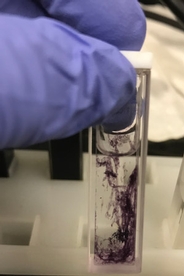Science
Experimental Biochemistry A Student-Driven Inquiry-Based Upper Level Undergraduate Laboratory Course

Capstone projects are an important, yet sometimes stressful, part of a student’s senior year. In the chemistry department, capstone projects have a unique aspect to them; they are research labs. Upper-level chemistry majors take Experimental Chemistry and Experimental Biochemistry (EBC), and upper-level biochemistry majors take EBC. Both courses are two-semesters in which students participate and then plan an original research project. During the first semester, students are assigned groups and each group is given a component of one large research project. Throughout the semester students work on all aspects of this project from data collection to data analysis. They present on their discoveries along the way. During the second semester, students develop a project of their own that builds off of what they have done in the previous semester. In this process students have complete autonomy. From hypothesis development to experimental design, data collection and analysis, students have complete control. This level of freedom, especially at the undergraduate level, allows students to gain critical research experience necessary for the next step after graduation, whether that be graduate school or employment.
The projects that students work on vary but recently they have centered around nanoparticles. Nanoparticles are particles between 1-100 nanometers in size. There is a wide range of types of nanoparticles. Nanoparticle applications include, but are not limited to, biosensors, drug delivery devices, environmental cleanup, solar energy devices, and gas sensors. In my first semester of EBC, we created gold and silver nanoparticles using three different proteins (lysozyme, myoglobin, and bovine serum albumin) as the reducing agent. In addition, we varied the pH to determine where nanoparticles would form and not form. The data gathered from this first semester was used and expanded upon in the second semester.
The independence allowed in this course as well as the originality of the research projects are unlike other lower level laboratory courses. There is no guarantee that these experiments will work, and often they do not on the first try. Parameters must be changed, hypotheses redrawn, and a new experiment done. In this way, EBC mirrors what happens in research labs around the world and what we will encounter as chemistry and biochemistry professionals. The importance of making mistakes and learning from them is incredibly important in the lab because research often does not turn out to be how one would expect. A good researcher knows how to take these failures, learn something, and move on.
This is not to say that what we do in EBC never works. In fact, the class over the years has had much success and generally publishes a paper each year on the significant research done by the students during the school year. This ability to continually produce solid results is safeguarded by close supervision and advice from professors. Dr. Zou, the Chemistry Department Chair and the current EBC professor, is always around to help students when stuck or to provide advice on the direction of the project. This allows students to both work independently on their own research and still be advised and taught by knowledgeable faculty. In this way, EBC is a gateway to the real world, providing students with independent research experience while still at the undergraduate level.
